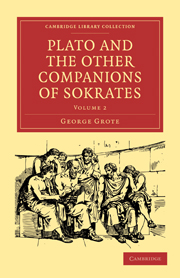Summary
Persons of the Dialogue
This dialogue is carried on between Sokrates and Menon, a man of noble family, wealth, and political influence, in the Thessalian city of Larissa. He is supposed to have previously frequented, in his native city, the lectures and society of the rhetor Gorgias. The name and general features of Menon are probably borrowed from the Thessalian military officer, who commanded a division of the Ten Thousand Greeks, and whose character Xenophon depicts in the Anabasis: but there is nothing in the Platonic dialogue to mark that meanness and perfidy which the Xenophontic picture indicates. The conversation between Sokrates and Menon is interrupted by two episodes : in the first of these, Sokrates questions an unlettered youth, the slave of Menon: in the second, he is brought into conflict with Anytus, the historical accuser of the historical Sokrates.
The dialogue is begun by Menon, in a manner quite as abrupt as the Hipparchus and Minos:
Question put by Menon—Is virtue teachable? Sokrates confesses that he does not know what virtue is. Surprise of Menon
Menon.—Can you tell me, Sokrates, whether virtue is teachable—or acquirable by exercise—or whether it comes by nature—or in what other manner it comes?—Sokr. I cannot answer your question. I am ashamed to say that I do not even know what virtue is: and when I do not know what a thing is, how can I know any thing about it attributes or accessories? A man who does not know Menon, cannot tell whether he is handsome, rich, &c., or the contrary.—Certainly not. But is it really true, Sokrates, that you do not know what virtue is? Am I to proclaim this respecting you, when I go home?
- Type
- Chapter
- Information
- Plato and the Other Companions of Sokrates , pp. 1 - 28Publisher: Cambridge University PressPrint publication year: 2010First published in: 1865

